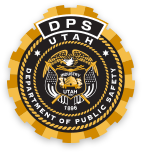A New Governor and a New Colonel
The 1948-1949 UHP budget consisted of $547,235.00, enough funding for 58 officers. This number was down from 67 officers just two years earlier and a high of 75 officers at the close of World War II. These cuts had come despite extensive growth and a significant increase in vehicle traffic in Utah. Colonel Dow asked the 1949 legislature for a budget of $1,030,00. Colonel Dow wanted to nearly double the size of the force from 58 to 100 officers. Although Colonel Dow was hopeful of significantly increasing the size of the Patrol in 1949, his career with the UHP was about to come to a swift conclusion.
In 1948, Governor Herbert B. Maw was seeking a third term in office. He was defeated by a substantial margin by Republican J. Bracken Lee. Governor Maw returned to the private practice of law. He died November 17, 1990.
Governor Lee was the former Mayor of Price. Governor Lee appointed Joseph W. Dudler, as the Colonel of the Utah Highway Patrol, effective April 1, 1949. Dudler had been a Patrolman with the Utah Highway Patrol from 1941 to 1945. In 1945, Dudler was elected Sheriff of Carbon County. Sheriff Dudler was a personal friend of J. Bracken Lee.
Governor Lee offered Pete Dow the position of Director over the State Bureau of Criminal Identification. Dow accepted, also effective April 1, 1949. The bureau functioned as a clearing house in the state for pictures, fingerprints, and records of persons involved in felonies. In 1949, BCI had approximately 400,000 records. Pete Dow would later recall that the job was mostly paperwork and “had no zip.” Dow was anxious to get back into police work. On November 1, 1956, Pete Dow accepted the position of Chief Deputy with Salt Lake County under Sheriff Beckstead. Dow held the rank of Captain.
Captain Dow held this position for nearly ten years. He spent the remaining few years, working in the Salt Lake County jail. After 37 years in law enforcement, Pete Dow retired on November 1, 1969. Peter Lorenzo Dow died April 7, 1995.
The 1949 legislature gave the Utah Highway Patrol a powerful new tool in prosecuting drunk drivers. For the first time a presumptive level of intoxication was written into the law. That presumptive level was .15 percent BAC.
Fire struck the Patrol’s dispatch center on February 6, 1949, at 11:30 p.m. Working around the clock, the Patrol’s two radio engineers successfully brought the station back on the air 40 hours later with a transmitter borrowed from KCPW and office space donated by the Murray Police Department. In March, the operation was moved to a temporary facility consisting of a truck furnished by the State Road Commission and a transmitter furnished by KDYL radio. This arrangement was utilized until the dispatch office could be rebuilt.
Prior to April 1949, the UHP dispatch center located at the state capitol, operated only 16 hours per day. Colonel Dudler immediately ordered 24 hour coverage. It was therefore necessary to hire four additional radio operators, bringing the total dispatch strength to six.
Colonel Dudler completely reorganized the ranks of the Patrol. When Colonel Dudler took the reins of the UHP, there was one inspector, five captains, six lieutenants and no sergeants. Colonel Dudler eliminated the rank of inspector, demoted all but one captain, and reassigned most lieutenants to the rank of sergeant.
During this reorganization, one captain demoted to lieutenant resigned, one lieutenant demoted to sergeant resigned, and three troopers were promoted to sergeant. Following this reorganization the Patrol consisted of one superintendent, one captain, four lieutenants, eight sergeants, one radio engineer, one sergeant-chief clerk, and 42 troopers. All of these changes became effective July 1, 1949.
Another immediate change implemented by Colonel Dudler was equipping all patrol cars with a rotating red light for higher visibility. All new vehicles were painted a very distinctive black and white to further increase visibility. The Patrol was about to enter two decades of growth and prosperity.

